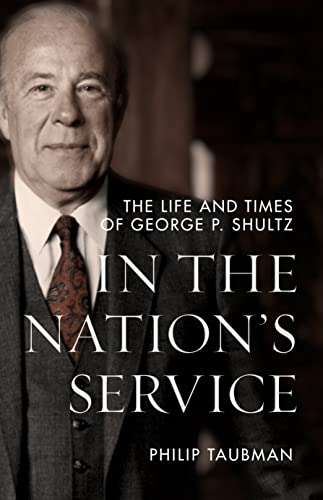In the Nation’s Service: The Life and Times of George P. Shultz

“The humanity and human touch of Shultz and his biographer emerge on nearly every page.”
This a very readable account of the life of one the greatest public servants of the past century, It is also likely to be the definitive account, because the author had access to the private papers of Shultz at Stanford’s Hoover Institution and, also at Stanford, the voluminous journal kept by his executive assistant in his first years as Secretary of State. As a reporter for The New York Times, author Philip Taubman knew Shultz for decades and sometimes flew with him to numerous foreign capitals. They also talked at Stanford.
Henry Kissinger once said, “If I could choose one American to whom I would entrust the nation’s fate in a crisis, it would be George Shultz.” My ex-boss, retired ambassador to Egypt Hermann Eilts had a similar opinion.
Having worked for nearly 30 years at the Times, Taubman became a lecturer at Stanford’s Center for International Security and Cooperation. He has written three other books on U.S. foreign policy. His is a family of writers. His brother William Taubman has written major books about Nikita Khrushchev and Mikhail Gorbachev. Their father, Howard Taubman (1907–1996) was music critic for the Times in the 1950s–1960s.
Few people have made their mark in so many domains as Shultz. He led Marines onto Japanese-held islands in World War II. Later, having earned a Ph.D. in industrial economics at MIT, he taught at MIT and then the University of Chicago where he became Dean, Graduate School of Business He held four cabinet level posts under presidents Nixon and Reagan: Secretary of Labor; Director, Office of Management and the Budget; Secretary of the Treasury; and then Secretary of State.
Shultz recalled that, “often in my career, I saw that genuine empathy is essential in establishing solid, trusting relationships. In 1973, when I was treasury secretary, I attended a wreath-laying ceremony at a World War II memorial in Leningrad with the Soviet foreign trade minister, Nikolai Patolichev. As we walked, Patolichev, a tough old guy, described the staggering death toll in the Battle of Leningrad. Tears streamed down his face, and his interpreter was sobbing. When we were about to leave, I said to Patolichev, ‘I, too, fought in World War II and had friends killed beside me.’ Looking out over the cemetery, I added, ‘After all, these were the soldiers who defeated Hitler.’ Facing the cemetery, I raised my best Marine salute, and Patolichev thanked me for the show of respect. Later on, to my surprise, I found that I had earned the trust of Soviet leaders as a result of this visit.”
As Secretary of State, Shultz overcame hawks in high places to help Ronald Reagan forge major arms control agreements with Soviet leader Gorbachev. Shultz opposed Reagan’s Strategic Defense Initiative (SDI or Star Wars) as technologically unsound and diplomatically problematic. However the ex-Marine believed in discipline to authority and so he supported Reagan’s infatuation with SDI and worked around the problems it caused.
Looking back, Shultz wrote: “In God we trust. Yes, and when we are at our best, we also trust in each other. Trust is fundamental, reciprocal and, ideally, pervasive. If it is present, anything is possible. If it is absent, nothing is possible. The best leaders trust their followers with the truth, and you know.”
If foreign policy issues do not ignite your interest, just read part one on growing up in Englewood, NJ, in a modest neighborhood adjoining millionaires’ rows; adventuring into Manhattan with Dad on Saturdays; a Protestant marrying a devout Catholic and raising five kids in the burbs while doing s doctorate at MIT. Curious about every detail, Taubman tells you what color dress Mrs. Shultz wore on what special occasion.
The humanity and human touch of Shultz and his biographer emerge on nearly every page.